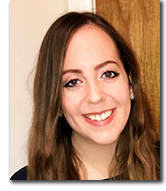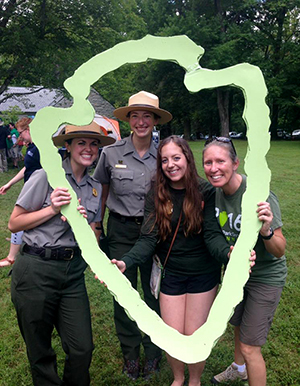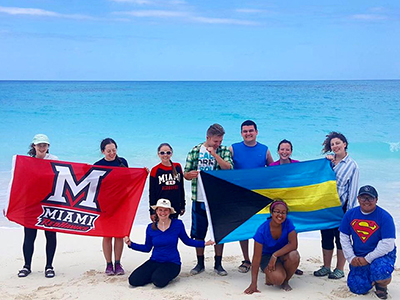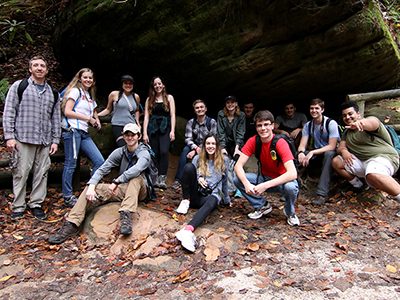
- honors junior Geology major, with a Geographic Information Science certificate
- from Coldwater, OH
- University Academic Sustainability Scholar
- former president of Miami's Geology Club; member of Engineers Without Borders
- conducted research on earthquakes caused by hydraulic fracturing in Ohio
- awarded a Sally Ride Internship from NASA's Science Mission Directorate (Spring 2018)
"There are a lot of opportunities with a major in liberal arts, so don't put yourself in a box and think you can only do one thing. If you get offered an opportunity, take it. For research in particular, if you know about a faculty member with an interesting project, go talk to them! The Office of Undergraduate Research is right in King Library, and if you talk to them they might be able to point you to an advisor who is working on a project that you like."
Why Miami?

Teresa Langenkamp with co-workers during internship at Great Smoky Mountains National Park (Summer 2016)
"I looked at a lot of schools, and I visited Miami to meet faculty in the Department of Geology and Environmental Earth Science. I really liked the size of the university and its geology program, and meeting professors in my area of study made me feel I could see myself here. The professors were very inviting and enthusiastic about the material, and this made me want to study it too.
"I'd been interested in geology since high school, when I met two female geologists. I wanted to do something scientific, but I didn't feel medicine or engineering were the right fit. Geology felt like the best of a lot of worlds because it combines chemistry, physics, and other sciences on a global, environmental scale. It's so broad that you can work many things into it!
"I came in as both an Honors student and a Sustainability Scholar, both of which helped me make a lot of friends. Most of us lived in the Honors living learning community in Tappan Hall, and it was fun to be in a group of motivated students who were so focused on school. I also got involved with club rowing, which was very challenging but helped me grow a lot.
"Here at Miami, I love how I have so many opportunities to interact with all my friends and professors, whether through class, clubs, or a campus job. It creates a positive, enthusiastic environment, and everyone feeds off that."
Best Miami Experiences
"During the spring of my second year, I got involved in a research project with professor of geology Mike Brudzinski. We were looking at earthquakes caused by hydraulic fracturing in eastern Ohio. Working on that project has been a big thing for me. Research makes you think and ask questions in different ways, and I've enjoyed working with a team that includes graduate students.

Teresa Langenkamp and other MU Geological Society members during visit to Gerace Research Center (Bahamas, Spring Break 2017)
"My specific area of focus is Noble county, but I've helped with the field work at various sites throughout the state. We have to maintain and check our seismometers in the ground, which sometimes involves installing or taking them out. Setting the equipment up, installing the solar panel, connecting it, making sure it's working properly — all of this can take a day or more to complete. Sometimes we have to find a site for the equipment, which includes digging a hole and placing it in the ground. The process is fascinating, and research has taught me to be open to new ideas and new ways of thinking. I've also learned problem solving, since sometimes things don't go the way you expect but you need to be creative and find a solution.
"I am a geology major in a club called Engineers without Borders, which is mostly engineering students, but there are also biology, geography, psychology, anthropology, and even English majors. We work together on real, interdisciplinary projects.
"I've also been a member of the Miami University Geological Society since I started at Miami. This past fall I led the club as president, and it's been awesome because we get to go on trips that involve hiking, camping, and rock collecting. We're all friends sharing an interest in the Earth.
"The faculty in my department have been very encouraging and supportive, whether it's about the research, my major, or my future career. They've helped me stick with things and believe in myself. I talk to Dr. Brudzinski a lot and have had several of his classes, so he's been a big influence, but I also work with graduate student Shannon Fasola and professor of geology John Rakovan, who was my very first geology professor. This year I was fortunate enough to plan our annual geology spring break trip with him, taking students to Central New Mexico.
"This spring I was awarded a Sally Ride Internship from NASA's Science Mission Directorate, which has taken me to NASA Ames Research Center, in the heart of Silicon Valley. I'm working on an erosional study of Earth and Mars using Digital Terrain models. We focus on locating areas of past and present water flow on Mars. This amazing experience is preparing me to go to grad school, where I'm considering fields in geophysics, seismology, or environmental science."
Miami and the Liberal Arts

Teresa Langenkamp and other MU Geological Society members during trip to Red River Gorge (Kentucky, Fall 2017)
"Liberal arts provides a really broad education, where you learn from a lot of different areas that you not have expected. The foreign language requirement, for example, was not something I'd thought I'd need to consider before I came to college, but during my first year at Miami I continued my Spanish language education with SPN 201 and 202. I am hoping to take my Spanish further by doing study abroad. I think learning another language is just awesome.
"Other required courses for liberal arts include biology, which I appreciate for rounding out my education even though I primarily study the non-living. Taking a variety of courses outside your major keeps things fresh and expands your thinking so you are not stuck on what you do.
"I love how geology takes you outdoors, forcing you to think how humans interact with the non-living systems. Geology plays a huge part in all of our lives that many of us don't even realize. Resources that we use every day, such as the water we drink, are often found or monitored by geologists. Some people think of geology as just rocks, but it's really the way the Earth works — the water and soil, which have living things in it, plus erosion, weathering, many important processes.
"Some advanced courses in geology have been my favorites. My geo-physics class was really challenging, but there were graduate students there as well and it was great to bounce ideas off them. We also took a field trip to Illinois for my mineralogy class, which was also great."
Studying Earthquakes Caused by Hydraulic Fracturing in Ohio
"So my freshman year I went on a spring break trip with the Geology Club, and we went out to Joshua Tree, California. And while we were out there, I was talking to the graduate students about their research projects, and one of them mentioned that he was studying earthquakes caused by hydraulic fracturing, and I was asking him more about that, how he got interested in earthquakes. He was telling me all about it, and his research advisor is Mike Brudzinski, and how much he loves his research advisor.
So I talked to Mike Brudzinski about it, and he said, 'We can get started on the project next year. Over the summer you can look at a few things, and if you like it we can keep going on with it, and if you don't like it, you know, you can always find another research project.'
"I actually stayed here over the summer to do work on it, and it's just been a mixture of field work, going out installing seismometers in eastern Ohio, maintaining them, and then looking at the data that comes back, evaluating, determining when the earthquakes are, what their sizes, and then what the relationship with hydraulic fracturing, and then later on putting that into words into a report, a poster, and sharing it with the scientific community.
"So we've got a network out in eastern Ohio; it's about five seismometers — instruments that measure ground movements — and they need to be maintained. Some of them, maybe a lightning bolt struck one, so we have to dig it up and replace it with one that is working. Another one, the landowner wanted it moved, so we had to dig it up and put it somewhere else. And then another trip was just installing a new one so that we had a new area where we could get better data. We can get the data remotely, but any time that we need to fix the machine or move it or put a new one in, that would require driving out to eastern Ohio and doing work. The whole process probably takes one to two days, but digging a hole that is at least three feet, and then doing all the electrical work, installing the machine, and then filling it up, making sure the solar panel is good to go, and then making sure that you're getting the data in like you need to.
"I am looking for earthquakes above a magnitude one. Ohio doesn't have a lot of large earthquakes, so I'm usually not going to see anything over a magnitude four. It's probably in the two to three range, to be honest, so these small earthquakes. But it's important to study the small ones because the small ones help you understand the big ones. So we've seen larger earthquakes cause by hydraulic fracturing and wastewater injection in places like Canada, and that could be a risk in Ohio if we upped our production because they have a higher production there. So we want to be aware, we want to understand the relationship better so that we can avoid them, because these earthquakes can cause damage to homes, water lines.
"It's expanded my ways of thinking, so, research, you're asking the question, and you don't know the answer. And sometimes you're going to encounter problems, maybe at your field site, and you got to get creative. It might be frustrating at the time, but it just shows you that you've got to keep going. Through the project I have talked with other scientists, especially graduate students, and that's encouraged me to want to go to graduate school and pursue a research project at that level. It's given me more confidence in my research abilities just by being involved in a project."
Advice to Students
"There are a lot of opportunities with a major in liberal arts, so don't put yourself in a box and think you can only do one thing. If you get offered an opportunity, take it.
"For research in particular, if you know about a faculty member with an interesting project, go talk to them! The Office of Undergraduate Research is right in King Library, and if you talk to them they might be able to point you to an advisor who is working on a project that you like.
"If you get involved with a project and find out it's not something you're passionate about, that's all right — you can get involved in another. It's all about finding what your passion is. When you take advantage of all the opportunities that Miami has to offer, you are going to feel more connected and involved, and you'll enjoy your overall experience so much more!"
[March 2018]
 Miami University Oxford, Ohio est. 1809
College of Arts and Science
Miami University Oxford, Ohio est. 1809
College of Arts and Science
 Miami University Oxford, Ohio est. 1809
College of Arts and Science
Miami University Oxford, Ohio est. 1809
College of Arts and Science